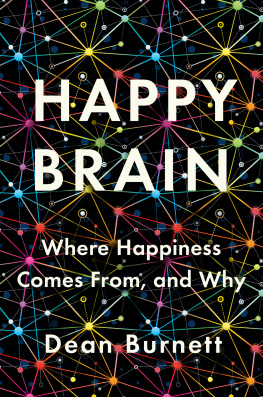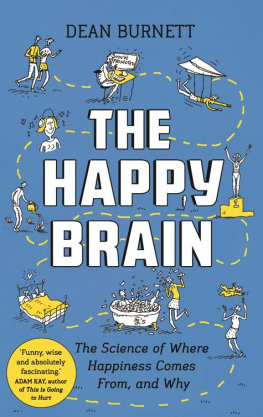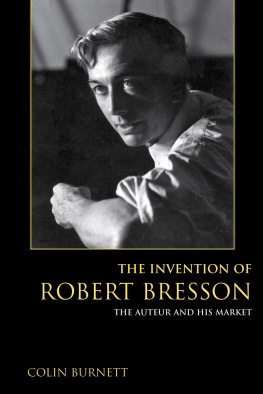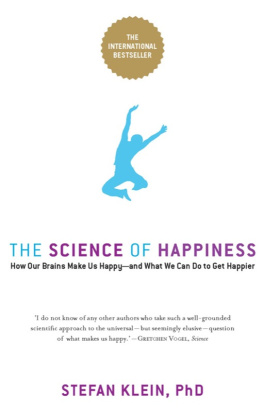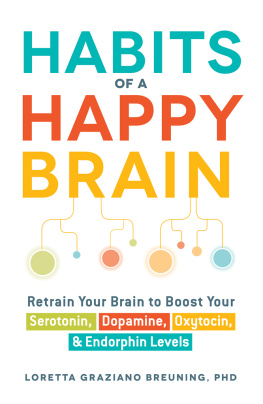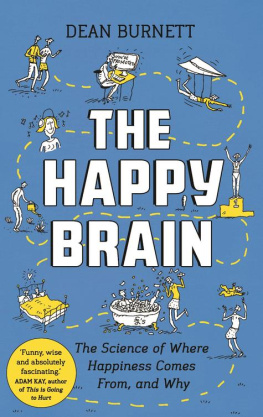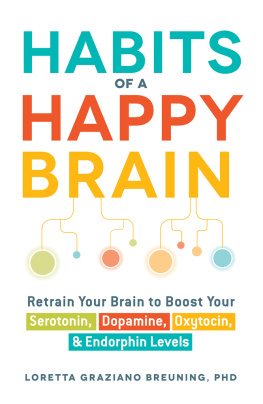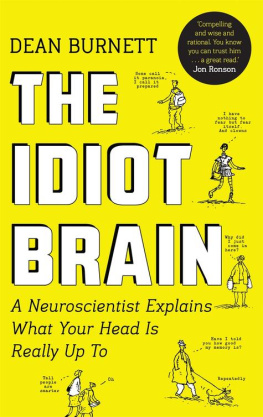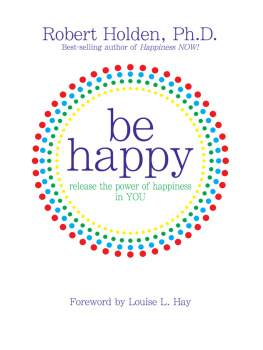
Happy Brain
Where Happiness
Comes From, and Why
DEAN BURNETT

Copyright 2018 by Dean Burnett
First published in 2018 in the UK
by Guardian Books and Faber & Faber Limited under the title
The Happy Brain: The Science of Where Happiness Comes From, and Why
All rights reserved
First Edition
For information about permission to reproduce selections from this book, write to Permissions, W. W. Norton & Company, Inc.,
500 Fifth Avenue, New York, NY 10110
For information about special discounts for bulk purchases,
please contact W. W. Norton Special Sales at
specialsales@wwnorton.com or 800-233-4830
JACKET DESIGN BY JAYA MICELI
JACKET ART ENJOYNZ / DIGITALVISION VECTORS / GETTY IMAGES
The Library of Congress has cataloged the printed edition as follows:
Names: Burnett, Dean, author.
Title: Happy brain : where happiness comes from, and why / Dean Burnett.
Description: First edition. | New York : W.W. Norton & Company, [2018] |
First published in 2018 in the UK by Guardian Books and Faber & Faber
Limited under the title The Happy Brain: The Science of Where Happiness Comes From, and Why. | Includes bibliographical references and index.
Identifiers: LCCN 2018002469 | ISBN 9780393651348 (hardcover)
Subjects: LCSH: BrainPopular works. | HappinessPhysiological aspects. | NeurotransmittersPopular works.
Classification: LCC QP376 .B87217 2018 | DDC 612.8/2dc23
LC record available at https://lccn.loc.gov/2018002469
ISBN 978-0-393-65135-5(e-book
W. W. Norton & Company, Inc.
500 Fifth Avenue, New York, N.Y. 10110
www.wwnorton.com
W. W. Norton & Company Ltd.
15 Carlisle Street, London W1D 3BS
To everyone who bought my first book.
This is all your fault.
Contents
As a wise philosopher once said, Happiness, happiness, the greatest gift that I possess. Aristotle, I think. Or possibly Nietzsche? Sounds like something hed say. No matter, the point is valid; happiness is important.
But what makes anyone happy? Why are different people made happy by different things, and at different times? Whats the point of happiness? Is there one? The reason I was interested was because I was meant to be writing a second book, but I had no idea what it should be about. Everyone I asked gave different suggestions, but eventually always said, Just write about what makes you happy. As a very literal, scientifically minded type, I tried to look this up: what does make us happy? But all I found was an avalanche of management fads and techniques, cod philosophy, self-help manuals, life coaches and gurus, all of varying degrees of dubiousness, and all insisting that they definitely knew the secret to happiness, no matter who you are. I wouldnt mind so much, but barely any of these secrets matched up, suggesting that a lot of them might be nonsense .
Case in point, here are some real headlines from the UKs notorious Daily Mail newspaper: Forget cashhow sex and sleep are the key to happiness; Key to happiness? Start with 50k a year salary; Why the secret to happiness is having 37 things to wear; Is treating yourself like a baby the key to happiness?; Key to happiness for over-55s? Buying a new pet and going for a day trip with lunch at a pub every month; The key to happiness? Handing out cakes on the street; and so on. Make of that what you will.
Even more annoying for a doctor of neuroscience, science writer and apparent go-to guy for mainstream commentary on brain-based news like me, is that a lot of these so-called secrets invoke my discipline, or constantly refer to some valid-sounding-but-unspecific aspect of the brains functioning, like dopamine or oxytocin or emotion centers, in support of their claims. If youre an experienced neurobod, you can easily spot when someone is just borrowing the terminology of your field to sound credible, rather than actually having any useful understanding of it.
And I thought, you know what? If youre going to exploit my field, at least put some effort into it. Sure, the brain isnt perfect, Im often the first person to point that out, but its still one of the most fantastically and terrifyingly complex things to study. To truly explain how the brain deals with happiness would take more than a vague two-line summary or a smattering of impressive-sounding terminology, it would take a whole book
And thats when it dawned on me. I could write that book! The one about how the brain really handles happiness at the fundamental levels. And thats the book youre holding now. Because if theres one thing I do, its go to ridiculous extremes to settle minor grievances, even if the party that caused them remains blissfully unaware of my existence.
So, this is a book about happiness and where it comes from in the brain. What causes it, and why? What makes our brains like certain things so much, but not others? Is there some sure-fire way of inducing happiness in any human brain like so many seem to claim, suggesting that happiness is like tapping a password into an online bank account? Can eternal happiness actually existand would it be desirable, anyway? Wouldnt experiencing the same thing day-in day-out for years on end be more likely to drive you to the edge of madness than provide everlasting satisfaction? And more.
One thing that is abundantly clear from the sheer variety of supposed secrets to happiness is that it has an undeniably strong subjective element. We all have different ideas of what makes, or will make, us happy, be it wealth, fame, love, sex, power, laughter, and so on. And yet we can only ever truly know what works for us . So, I wanted to include insights from a wide range of people from different walks of life, to see what makes them happy (or not). As a result, I ended up talking with stars of stage and screen, millionaires, leading scientists, journalists, ghost-hunters and one person who well, lets just say that in no other research Ive done did I ever hear the term sex dungeon used so freely and so often.
I should warn you though, that this is not meant to be a self-help book, or some model for how to live a happier and fuller life, or anything like that. Im just fascinated by the brain and all that it does, and one of the things it does is allow us to experience happiness. It was my intention to explain, to the best of my abilities, how it does this. I hope youre happy with that. Although if youre not, Ill understand why.
And once youve read the book, so will you.
Would you like to be stuffed into a tube? Head first?
Dont answer yet, because theres more.
Would you like to be stuffed head first into a tube, a cold and confining one, where youre not allowed to move? For hours at a time? A tube that makes incredibly loud noises, an ongoing din of clicks and screeches like an enraged metal dolphin?
Pretty much everyone would say no if asked this question, before hurriedly seeking out the nearest authority figure. However, imagine not only agreeing to this, but actually volunteering for it. Repeatedly! What sort of person would do that?
Well, me. Yes, Ive done this many times. And I would do it again if asked. I dont have a weird and incredibly specific fetish, but I am a neuroscientist, a keen student of the brain and a science enthusiast, so in the past Ive volunteered for various neuroscience and psychology experiments. And since the dawn of the current millennium, many of these experiments involved having my brain probed by fMRI.
MRI stands for Magnetic Resonance Imaging, a complex high-tech procedure which uses powerful magnetic fields, radio waves and several other types of tech-wizardry to produce very detailed images of the inside of a live human body, revealing things like broken bones, soft tissue tumors, liver lesions and alien parasites (probably).
Next page
